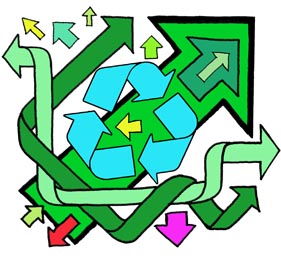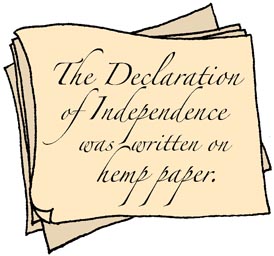|
 Last
week I posted a controversial article, called Questioning
Paper Recycling. Needless to say, it's been a topic of discussion
all week, but that was actually something I was hoping for...
last week we also launched a new mailing list, the Eco
list, and we wanted to get some interesting conversations
started. And it's been working -- we've been having some fascinating
discussions over there! Last
week I posted a controversial article, called Questioning
Paper Recycling. Needless to say, it's been a topic of discussion
all week, but that was actually something I was hoping for...
last week we also launched a new mailing list, the Eco
list, and we wanted to get some interesting conversations
started. And it's been working -- we've been having some fascinating
discussions over there!
So the question everyone's wondering now is, am I going to
give up on paper recycling, or have my eco-friends persuaded
me that Penn & Teller are themselves full of crap? In short,
the answers are no and mostly.
I pride myself on being able to change my mind, on accepting
truths and altering my position as needed when confronted by
reality. What this means in practice is that *everything* is
open to debate. To Question Everything means that all theories
and beliefs must be challenged at some point.
One trick I recommend for keeping your mind flexible is to
actually try changing your opinion about something for awhile,
to see how that change holds up. It's like playing Devil's Advocate,
or role-playing someone else's point of view. Get into the other
person's brain and see what it's like in there for awhile before
you decide that they're wrong.
But the best reason for embracing a radical point of view
the way I did was to get my peeps to help me figure out how to
react to it. The reason I clicked on the Penn & Teller video
in the first place was because I had friends asking me what I
thought about the show's anti-recycling arguments, and for me
to maintain a belief system, I need to know how to reply when
I'm challenged by those who don't subscribe to my beliefs. So,
by turning to some of my other friends and saying, "I think
these guys have some good points, what do you think?" I
get a whole bunch of brains working on the question at once.
(In other words, I got my friends to do my homework for me. (Thanks,
friends!))
I think the single best go-to point for rebuttals I've seen
so far is "Anti-Recycling
Myths Commentary on 'Recycling is Garbage'." It addresses
a lot of P&T's claims, about all types of recycling, but
as I said before, it's paper recycling that I've mainly been
questioning. And some of the things I've been hearing do support
my doubts. For example, there's this quote from Martin Blick
of Champion Paper: "We are not talking about the rain forest
or old growth in the Pacific Northwest. Most of the trees cut
for paper come from fifth or sixth generation pulp-wood forests."
But even if that's true for Champion Paper, I'm hearing that
other companies aren't so scrupulous and that some of our paper
does come from rainforest wood. That really sucks... our planet
is going to totally regret it when all the rainforests are gone,
which makes this a clincher for me.
Does this mean I'm totally retracting last week's article?
No. I am going to keep recycling, but my faith in it has still
been shaken. I try hard to see most issues in shades of gray,
but I've always been pretty black-and-white in my thinking about
recycling. Now I've become a skeptic even about that.
But in truth, I find it incredibly difficult to throw *anything*
away if I think it has some sort of value, so while I may continue
to question issues surrounding recycling, in my heart of hearts
there's no way for me really to give up on the concept. I'm too
much of my mother's son, who taught her kids so well the lessons
she learned as a child of the Great Depression, about the value
of everything: "Use it up, wear it out, make it do, or do
without," she would say, 38 times a day, and now I do that
too. I believe it's good to use everything to its fullest, rather
than throwing away that which still has some value, and that's
the essence of recycling. It's like trying to use every part
of the buffalo.
All that said, when it comes right down to it, I tend to think
of recycling as a rearranging of the deck-chairs on the Titanic
sort of thing: what humans are doing to this planet is so vastly
destructive that recycling isn't really going to matter all that
much. But everybody's got a gree-gree,
so hey, let's keep on recycling. Maybe it will help a little...
I also have to say, this whole debate has left me feeling
disappointed with Penn & Teller. They cherry-picked and used
other statistical charlatanism in order to make the data seem
to fit their arguments (for example, they compared the number
of trees we have now to the tree-count of 1920, the lowest point
in our history, rather than, say, 1491). And yes I know, these
guys are magicians putting on a show, but given that the entire
premise of this particular show is supposed to be about demanding
the real truth, they shouldn't be fudging the data.
It happens that we actually know Penn slightly, having met
him in the late Eighties when P&T visited our lab at NASA
(they loved touring high-tech places like the facility Kristin
& I worked
in back then) and we actually hung out a few times while they
were in the area for an extended gig in 1989. (We even got to
see the Letterman show live with their VIP passes when they were
guests, and my sister freaked out when she happened to see Kristin
& me on TV, when we appeared, ever so briefly, in a shot
of the audience.)
Anyway, even though magicians are dishonest for a living,
I've always thought P&T were straight-up guys at their core,
being outspoken skeptics and the kind of magicians who admit
it's all a trick and sometimes even show you how it's done. It
was their credibility with me that caused me watch this BS with
an open mind, and that credibility has suffered some as a result.
|
|
 But
as I said before, P&T are still totally right about
the Drug War. Please join me in Praying
for Drug Peace. But
as I said before, P&T are still totally right about
the Drug War. Please join me in Praying
for Drug Peace.
And speaking of both paper-manufacturing and the laws against
marijuana (which include the non-psychoactive hemp plant), I
really need to say a bit more about the numerous suppressed uses
of industrial hemp. As I observed long
ago, an acre of land planted with hemp can turn out paper-quality
pulp 4 times faster than an acre of trees. Hemp is so much better
suited for making paper, as it turns out, that the entire War
on Marijuana may have gotten started because of it.
It's not widely understood (some even attempt to dismiss this
as a conspiracy theory) but back in the 1930s there was a business
tycoon named William Randolph Hearst. (He was the inspiration
for Citizen Kane.) He owned the whole system: not just newspapers
and magazines, but paper-making equipment to supply his printing-presses,
and millions of acres of prime timberland with which to keep
the paper-mills going. He had it all figured out.
And then a machine was invented (called a hemp decorticator)
which simplified the process of making paper from hemp. Sensing
a threat to his monopoly, Hearst used his power as a publisher
to promote a hoax about the evils of marijuana with a relentless
series of sensational and wildly inaccurate headlines about "Reefer
Madness." This culminated in a movie (in 1936) and the first
laws against marihuana (in 1937), which in turn wiped out the
new hemp industry just as it was getting started. Thus it was
insured that we'd be making toilet paper out of trees for generations
yet to come. It's just another example of how the
Drug War Hurts America.
|
 |
"I agree [that it takes a lot of courage for Andy, a
self-proclaimed hippy, to even consider denouncing recycling].
I've had many wonderful conversations with Andy, and even when
we don't agree he's very willing to listen to my side, and actually
consider changing his mind. (Many people have trouble doing this.)
I only hope that I can be so strong in my critical thinking skills
as he is." -- John
Cooper, on the Eco
mailing list this week (wow, coming from you John, that is
high praise indeed!) |
 |
In any discussion of recycling
we should always remember that it's best of all to reduce and
reuse. With that in mind, here are 3 tips from our daily life
which I highly recommend:
- Bring your own reusable cloth shopping bags to the market
so you can say "Neither" when they ask "Paper
or plastic?"
- Say "I don't need a bag, thanks" when you forgot
to bring your own bags and you're only getting a couple of items
which you can easily carry home without a bag (it drives me nuts
when clerks automatically shove a solitary purchase into a plastic
bag)
- Bring your own reusable food storage containers with you
when dining out, so you can take home a doggie bag without getting
(and just throwing away) those big styrofoam clamshell things
|
 |
"Ultimately, all our efforts at recycling are tiny in
comparison to the one on-going juggernaut event that is the growth
of human civilization. When I was in high-school, I read something
about recycling and environmental policies that stated with some
statistical authority that the one biggest impact any person
could have in protecting the environment was to not reproduce.
Talk about a gree-gree. You can rail against urban sprawl and
pray for sustainability all you want, but people just keep having
children, and every single one of them wants to grow up, have
a house, stay warm, eat food, drive a car, have their own children,
etc., and it's pretty tough to tell folks that that might be
bad." -- Dan
Brashler, on the Eco mailing list |
|